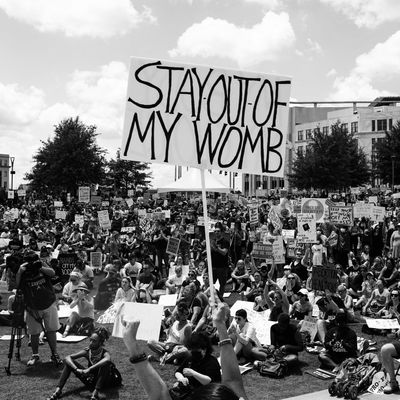
All charges have been dismissed against a 24-year-old woman in Tifton, Georgia, who was arrested last month after she lost her pregnancy at 19 weeks, the Tift County district attorney’s office announced on Friday. The case had alarmed reproductive-health advocates, who said it was the first time authorities had attempted to use a fetal-personhood law that has been on the books in Georgia since 2019 to bring criminal charges against someone.
The woman, who was found bleeding and unconscious from a miscarriage, was charged on March 21 with concealing the death of another and abandonment of a dead body after she disposed of the fetal remains at the dumpster of her apartment complex. She could have faced up to 13 years in prison if found guilty. But Tift County district attorney Patrick Warren said that his office is dropping the charges because “continuing prosecution is not legally sustainable and not in the interest of justice,” according to local outlet WALB 10 News.
Advocates said the charges being dropped was the only appropriate outcome in this case. “I want to emphasize that these charges should have never been brought in the first place,” says Dana Sussman, senior vice-president of the legal-advocacy group Pregnancy Justice. “We were interrogating Georgia law, trying to figure out what the legal theory was, and we could not identify one.”
In his announcement, Warren said Georgia law requires that a person be “born and existed separate and independent of its mother” in order for the concealing the death of another and abandonment of a dead body statutes to apply. The coroner had determined the fetus’s gestational age in this case was 19 weeks — meaning it was several weeks away from being viable — and that the woman had a natural miscarriage. While the charges were brought due to how the woman disposed of the fetal remains in the midst of her medical emergency, she told investigators that she did not know what else she could have done with them, according to Warren’s statement.
“While law enforcement acted in good faith and responded to a very difficult and emotional situation, it’s now clear that no criminal law was violated,” Warren said, according to WALB. “As chief prosecutor, it’s my responsibility to take a step back and look at the complete picture. In this case, the medical examiner’s findings — combined with the legal standards — make clear that continued prosecution is not appropriate. This case highlights the importance of careful review and thoughtful decision-making, particularly in sensitive situations like pregnancy loss.”
Sussman says her organization often sees these sorts of overzealous judgment calls from law enforcement given how heavily policed pregnancy is in the current political landscape. “Imagine if there is the discovery of fetal remains, and it’s treated as a health issue,” she says. “Like, let’s make sure that this woman gets the care that she needs without ever involving or connecting it to law enforcement. But we are seeing these things treated as criminal acts when these are natural and normal occurrences that happen to pregnant bodies.”
Though pregnancy criminalization has long been an issue in the U.S., there has been an uptick in cases since the Supreme Court overturned Roe v. Wade nearly three years ago. A Pregnancy Justice report found that in the first year after Dobbs, at least 210 people faced criminal charges in connection with their pregnancies — the most in a single year that the organization has tracked. Twenty-two of those cases involved miscarriages or stillbirths.
In these cases, people often have been prosecuted for what they do with the fetal remains, as there are no laws or universal standards either in Georgia or elsewhere in the U.S. dictating how to dispose of them. “We have seen criminal charges associated with disposing of it in a dumpster,” Sussman says. “We’ve seen criminal charges when people have shown up at the hospital with fetal remains. We’ve seen criminal charges when people have buried fetal remains.”
Sussman hopes that the woman at the center of the Georgia case can now move on and heal. “The harm and the trauma of this experience — by virtue of being arrested and facing these kinds of charges after a devastating medical emergency — are still very real,” Sussman says. The woman’s family has created a GoFundMe to help them navigate an incident that they say had caused everyone “emotional, financial, and mental stress.”
The Cut offers an online tool you can use to search by Zip Code for professional providers, including clinics, hospitals, and independent OB/GYNs, as well as for abortion funds, transportation options, and information for remote resources like receiving the abortion pill by mail. For legal guidance, contact Repro Legal Helpline at 844-868-2812 or the Abortion Defense Network.
